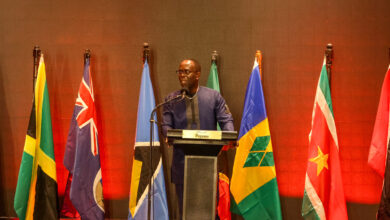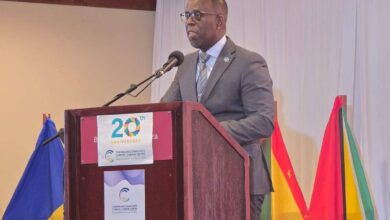Hon. John Rahael, Minister of Health of Trinidad and Tobago
Assistant Director of the Pan American Health Organisation (PAHO), Dr. Carissa Etienne
Chairman of the Governing Council of the Caribbean Epidemiology Centre (CAREC),
Dr. Bhoe Tewarie and Members of the CAREC Council
Director of CAREC, Dr. James Hospedales and his Management team and staff
Members of the Diplomatic Corps
Members of the Media
Other Distinguished Ladies and Gentlemen
Greetings! It is my pleasure, as Secretary-General of the Caribbean Community, to be present and to be afforded the opportunity to offer some remarks at this Opening Session of the Thirtieth Meeting of the Council for the Caribbean Epidemiology Centre (CAREC), one of the most valuable and valued health institutions in the Region. It is for me a first.
I do so with a deep and abiding sense of pride for a number of reasons: firstly, because CAREC is one of the institutions that has evolved from the wisdom and foresight of the Community's Founding Fathers and secondly, because it represents Caribbean people assuming leadership, assisted by a number of international allies, in ensuring the central place of the health of our people in national and regional viability. Health you may recall, has been a pivot of successful functional cooperation that has characterised the workings of the institutions of our integration movement. The very first meeting of the Conference of Ministers of Health you may recall, took place in 1969 in this very city of Port of Spain, thereby predating even the official establishment of CARICOM.
Let me begin by recognising Dr. James Hospedales of Trinidad and Tobago, as the first Caribbean-born Director of this august institution, CAREC. I also congratulate another Caribbean citizen, Dr. Carissa Etienne, who hails from Dominica, on her elevation to the position of Assistant Director of the Pan American Health Organisation. Finally, in referring to PAHO and its contribution to the Region, one cannot fail to recognize the seminal role played by its former Director, Hon. George Alleyne, OCC, of Barbados.
Regional Context
Ladies and Gentlemen of the Governing Council of CAREC, this meeting is taking place at a time when the Region is engulfed in several events vital to its future development. Chief among them is the attempt to make the Region CSME-ready by the end of next year. Indeed some of our Member States including Barbados, Jamaica and Trinidad and Tobago, have pledged to complete all necessary arrangements by the end of this year. We look forward later this year, to the Inauguration of the Caribbean Court of Justice (CCJ) – a central pillar of the CSME. Despite a few hiccups, the process is well on its way.
We are also involved – and no link is intended – in the development of a regional crime and security strategy. This task, received a significant boost from a major presentation at the recently concluded Inter-Sessional Meeting of CARICOM Heads of Government, by the Prime Minister of Trinidad and Tobago, in his capacity as CARICOM Lead Head of Government with responsibility for Crime and Security. No doubt this strategy will be further advanced at the upcoming meeting between CARICOM's National Security Ministers and the U.S. Secretary for Homeland Security.
The pursuit of our external negotiations is another area in which we are currently pre-occupied, facing as we do negotiations in the World Trade Organisation, for the Free Trade Area of the Americas and as from next week, with the European Union for an Economic Partnership Agreement. In this regard, we hold the unenviable record of being involved in these three critical trade negotiating theatres simultaneously. And our resources are slim!
Important as the above-mentioned matters are, we cannot afford to delay much longer the rationalization of our Region's air transport system if we are to avoid disenchantment and fragmentation of our Region, and thereby imperil the achievement of our flagship activity, the CARICOM Single Market and Economy. Allied to this objective are the current efforts for scaling up our information and communication technology. This is an essential feature for the strengthening of our Community in various ways, including the building of linkages between our tertiary educational institutions and the more effective management of community affairs, in an increasingly competitive world.
A historic and herculean challenge which we now face as a Region, is the hosting of the Cricket World Cup in 2007 – the biggest sporting event in our history. It will call for the highest levels of planning and execution and will consume the energies of virtually all sectors of our society.
Two other challenges require special mention. I refer firstly to the current crisis situation in Haiti, the most recent Member State of the Caribbean Community. This issue calls for a special discourse by itself. The second, and one more closely linked to the objectives and purposes of this Institution, is the onslaught by the HIV/AIDS pandemic on our societies, of which more anon.
All these challenges which characterise the current regional environment, need to be tackled in varying degrees, simultaneously. Apart from the inherent difficulty posed by the very nature of these challenges, this simultaneity is one of the special difficulties that the Region faces with its limited resources, some of which are also being lost through migration to more developed countries.
These factors highlight the value of developing regional and international partnerships in our efforts to confront the various challenges. An important example in this regard, relates to the partnership the Region has been able to establish, and the resources mobilized in the fight against HIV/AIDS, from Institutions and Bodies such as: PAHO; the Global Fund; the European Union; CIDA; UASID; the IDB; UNAIDS; UNDP; DFID; GTZ; KFW; and the World Bank. I need to stress this fact, as it underscores the importance of our Foreign Service and of diplomatic relations, the fruits of which in many cases, may virtually mean saving the lives of many in our population.
CAREC's Illustrious History of Achievement
Your Institution, CAREC, has been the fortunate beneficiary of such support, which has helped it over the past 30 years to build a reputation as the premier regional public health institution. Its alliance with PAHO as well as the CARICOM Health Sector Development Programme, has not only been a fruitful one, but a defining one. It has contributed in no small measure to the enhancement of the Region's health and welfare. This is attested to by the rapid strides that the Region has made in areas such as the eradication of polio, the radical reduction in rubella and measles, all resulting in an incalculable saving of lives and of health costs. In this regard our accomplishments in primary health care are comparable to those of many developed countries.
Challenges
I have been advised that, regrettably, we are currently in danger of losing much of these gains. Some of our Member States, for example, have begun to experience reversals in health status. Statistics show that over the past two decades there are some disturbing trends such as:
Increasing incidence of non communicable chronic disease affecting both young and older people;
Re-emergence of diseases such as tuberculosis and malaria; and
the emergence of new ones such the Ebola virus, SARS and HIV/AIDS.
These all impact negatively on the overall development of the Region, as the evidence points clearly to the intricate link between health and development.
Nassau Declaration: Health and Wealth of the Region, a Guideline to Action
As we reflect on the challenges facing CAREC and our other health institutions in the Region we can readily understand the underlying values of the Nassau Declaration emerging from our Heads of Government meeting in The Bahamas in 2001. That Declaration, enunciating that 'the Health of the Region is the Wealth of the Region' is more than mere rhetoric. It underscores the need for policies and programmes that place the health of our people at the centre of our development efforts.
In this regard, we must not adopt the stance that 'it cannot happen here'. For though we have been blessed with a people who are vibrant, creative and industrious – qualities that have helped us, over the years to accomplish much with little – we need to enhance significantly our investment in the health of our people, if we are to be able to continue to overcome the economic and other shocks as well as the natural and man-made disasters, to which we have been subjected over time.
The Nassau Declaration identifies two major pillars on which to anchor the investment in the health of our people and thereby contribute to development of our Region:
One pillar, The Caribbean Cooperation in Health Initiative coordinated by the CARICOM Secretariat in collaboration with PAHO/WHO, aims to implement programmes in priority areas such as chronic non-communicable diseases, mental health, health and family life, health information systems and training of health professionals;
The other pillar, The Pan Caribbean Partnership against HIV/AIDS (PANCAP) also coordinated by the CARICOM Secretariat, is being hailed by the UN as a model regional vehicle for accelerating the response to HIV/AIDS .
In both these regional models of cooperation, CAREC plays a vital role. One cannot therefore avoid the conclusion that investing in CAREC is an essential prerequisite for this Region's development.
CAREC and HIV/AIDS
CAREC's role in the Caribbean's response to HIV/AIDS predates PANCAP. There has however, undoubtedly been mutually beneficial reinforcement by PANCAP. The HIV/AIDS virus has become a major scourge in our Region affecting all races, social classes and age groups. The poor, and more so the poorest among the poor, women, children and adolescents and youth are the worst affected. (The latest estimates show that the Caribbean Region has 500,000 people living with AIDS in a world population of 40 million with this disease). One of the most disastrous effects of this scourge is the number of orphaned children (estimated at 15 million) that it leaves in its wake. It also gives rise to acts of discrimination that infringe on human rights and dignity of people living with HIV/AIDS. Finally, it is fast reversing the developmental gains that we, as a Region, have worked hard to achieve and to sustain, since approximately 70 percent of those with the disease are between the ages of 15 and 35 years old.
CAREC has been in the forefront of the advocacy for prevention and for care and treatment for people living with HIV/AIDS from the beginning of the disease cycle some 20 years ago, when its surveillance showed that the threat to the Region was likely to be disastrous. In partnership with UWI's Health Economics Unit and the Caribbean Regional Network of persons living with AIDS, CAREC took the message of the threat of the AIDS epidemic to over one dozen Cabinets and Parliaments, resulting in many countries awakening, at the highest level, to the threat to national and regional development posed by AIDS and making policy and funding decisions to more decisively combat the epidemic.
CAREC also spearheaded the coordination of CARICOM's position at the Special Session of the UN General Assembly on HIV/AIDS in 2001. Now as a core partner in the PANCAP, CAREC has responsibility for coordinating the care, treatment and support component of the Caribbean Regional Strategic Framework against HIV/AIDS. This is a major challenge for CAREC and the rest of PANCAP.
While we hear of lofty plans what we need most is action. The Region therefore demands of CAREC and the other partners within PANCAP, much greater speed in accelerating more widespread access by people living with HIV/AIDS to affordable ARVs, to voluntary counseling and testing, to training of health care and other professionals in schools and communities, to the establishment of more effective information and communication systems. We need to ensure that people living with HIV/AIDS are guaranteed their human rights in the workplace and in society generally. This calls for us to put in place appropriate systems, i.e. systems that reduce stigma and discrimination on the one hand and those that help to shape the necessary behavioural changes, on the other. Without this two-pronged approach, this lethal disease will continue to ravage our productive human resources, in particular our youth (especially young women), and the poor generally.
CAREC and the Broader Health Reform Agenda
CAREC also has a vital role in the broader health reform agenda. We look to the Centre, in its collaboration with PAHO, the Caribbean Regional Drug Testing Laboratory (CRDTL) and Pharmaceutical Procurement Security (PPS) to ensure sustainable access to sufficient and affordable drugs and pharmaceuticals. We also look to it for timely, accurate and reliable data on which to hang our policies for care and prevention, not only for HIV/AIDS but for the CCHII initiative as well.
These are great expectations, but after thirty years of invaluable service to the Region, we do have good reason for high expectations of CAREC. We want it to be our Centre for Disease Control for the Caribbean. More than ever we need a viable health surveillance system which functions as a regional enterprise. To achieve this, we need to support CAREC to grow and to become a mature enterprise with the required skills and resources. The time is opportune as the Multi-Lateral Agreement, which entrusts the administration of CAREC into the hands of PAHO on behalf of Caribbean governments, will soon come to an end, and we will all – and I emphasise ALL – have to determine the future role that this most crucial institution will have to play. I had the opportunity recently to broach these issues with the current Director of PAHO, Dr. Mirta Roses whose contribution to this process, I have no doubt will be significant.
In this regard, we note with relief that the long overdue regional institutional review of CARICOM health institutions has commenced. We anticipate that this review will help us in the quest to:
Harmonize our approaches to health and development;
Identify where necessary, new or more appropriate arrangements for governance;
Establish more efficiency in the allocation of resource;
Develop more effectiveness in the structure and implementation of programmes;
Create modalities where appropriate, for rationalisation of resources.
We also expect the evaluation of our regional health institutions to take cognizance of the framework for action included in the Nassau Declaration. It is an essential requirement for carrying forward and even redefining the elements of the Caribbean Cooperation in Health initiative (CCH). These have implications for the future of CAREC.
This review of our health institutions is taking place at the same time as another complementary initiative, the Caribbean Commission on Health and Development chaired by Hon. George Alleyne, OCC. The aim of the Commission is to examine the main issues related to managing, capacity building and financing health, in the context of CCH II and to advise Caribbean governments on the options for linking health and macroeconomic policies. This activity, recommended by our Ministers of Health at our Council for Human and Social Development (COHSOD) in April 2002, is intended to follow the model of the WHO Commission Chaired by Professor Jeffrey Sacks on Macroeconomics and Health in the World system.
The review and revision of our health institutions should be but part of a wider institutional review in the Community leading to fundamental structural change and realignment of institutions. The time may well have come for a community institutional design wherein there are specialised community agencies not only for education and disaster management for example, but also for health, for security and perhaps for technology as well.
This meeting is therefore taking place in a dynamic backdrop of highly relevant activities. I expect that your deliberations will take these into consideration as you try to deal with some of the more concrete and operational issues of management and financing of CAREC's work programme and budget. I have noted with keen interest, the breath and scope of your work programme and the critical elements it covers, such as tourism, food security, epidemiological and surveillance data, strengthening and support of national laboratories – all of which are necessary for the Region's sustained health, well-being and socioeconomic development.
Ladies and gentlemen of the Governing Council, you will therefore understand why I consider your meeting a vital one, not just business as usual. It is one in which you need to invest some time and effort in appreciating how much the Caribbean is changing and how, as owners of CAREC, we must invest more time and effort in ensuring that this Centre is of even greater and more effective service not only to our Caribbean people and countries but also to the millions of people who travel to, vacation and invest in our Region.
In the face of CAREC's many achievements and of its numerous challenges, I wish to commend the Centre, its Director and dedicated staff for the valuable work it has been doing and for the services it has been providing to the Region.
Ladies and gentlemen of the Governing Council, I wish you a very successful and productive meeting and take this opportunity to assure you all, of the CARICOM Secretariat's continued support, cognisant of the fact that ultimately the Health of the Region is indeed the true wealth of the Region.





